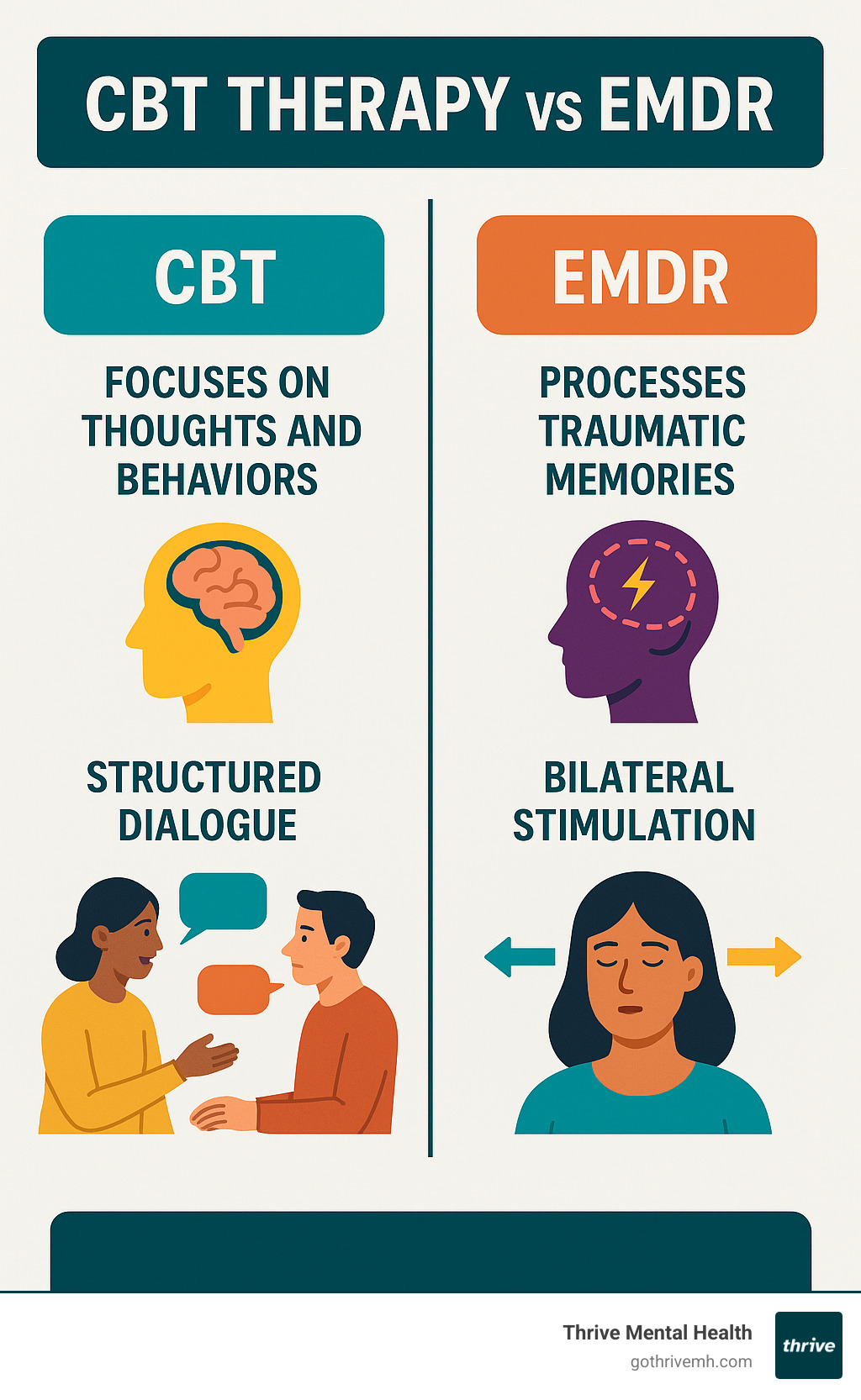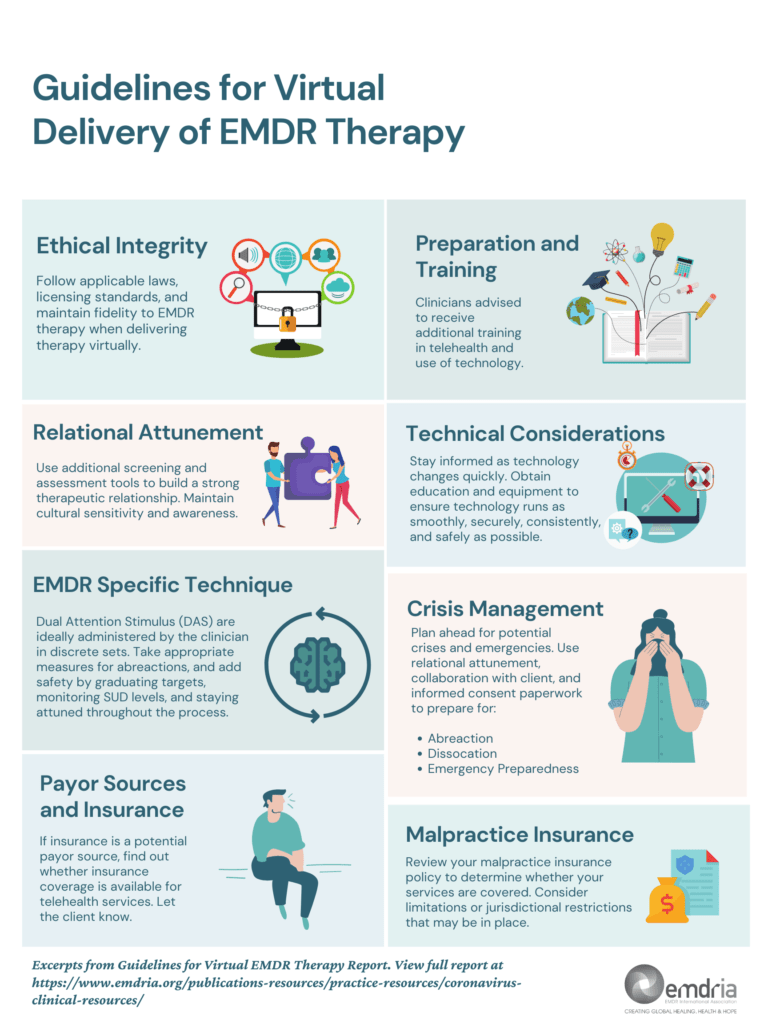EMDR therapy treatments outlined clearly for understanding
Understanding EMDR Therapy: Discovering Its Advantages and Benefits for Mental Health
EMDR treatment has actually emerged as a significant technique in the domain name of psychological health, especially for those coming to grips with injury. Its organized approach of processing upsetting memories sets it besides typical treatments. The possible renovations it offers for different emotional obstacles necessitate closer evaluation. As individuals seek reliable remedies for their mental wellness, understanding the subtleties of EMDR might provide important understandings right into its advantages and applications. What exists underneath its healing pledge?
What Is EMDR Treatment?
Eye Motion Desensitization and Reprocessing (EMDR) therapy is a structured method designed to reduce the distress connected with traumatic memories. Developed by Francine Shapiro in the late 1980s, EMDR integrates components of cognitive-behavioral treatment with reciprocal stimulation, usually with directed eye movements - emdr therapy new york city. The treatment aims to help people procedure and reframe terrible experiences, decreasing their psychological cost and effect on every day life
Throughout EMDR sessions, customers recall distressing memories while all at once taking part in certain bilateral excitement methods. This dual emphasis is believed to facilitate the mind's natural recovery procedures, permitting the assimilation of interrupted memories. EMDR is typically employed to deal with conditions like trauma (PTSD), stress and anxiety, and depression. Its organized nature and adaptable structure make EMDR available to a varied variety of customers, providing hope and remedy for the concerns of unsolved trauma.
The Scientific research Behind EMDR
Understanding the devices underlying EMDR therapy exposes a fascinating interplay in between neurological actions and emotional processes. Study indicates that EMDR triggers the mind's information handling system, promoting the combination of stressful memories. This process appears to involve the reciprocal stimulation typically made use of in EMDR, which can aid re-wire neural paths connected with distressing experiences.
Research studies have actually revealed changes in brain task patterns throughout EMDR sessions, particularly in areas associated with psychological regulation, such as the amygdala and prefrontal cortex. These modifications recommend that EMDR might lower the emotional charge of distressing memories, therefore permitting people to process their experiences much more adaptively.
Furthermore, neuroimaging research studies highlight modifications in the default setting network, which might play a duty in how people associate to their memories. Overall, the scientific exploration of EMDR underscores its potential efficacy in promoting mental wellness through a complex interaction of cognitive and neurological mechanisms.
How EMDR Works: The Process Explained
While many therapeutic approaches focus on spoken handling, EMDR uses a distinctive technique that incorporates bilateral stimulation to promote healing. The procedure starts with the therapist assisting the client identify traumatic memories or ideas. When these targets are established, the therapist overviews the customer with a series of eye movements or various other types of bilateral stimulation, such as touching or acoustic cues. This stimulation is thought to help in processing the memories, permitting the mind to reprocess traumatic experiences extra adaptively.
Throughout the sessions, customers may experience an array of emotions and understandings as they challenge their memories. The specialist preserves a helpful environment, making certain the client really feels risk-free throughout the procedure. After the excitement, the specialist aids the client review any kind of adjustments in their sensations or thoughts pertaining to the targeted memories. This organized approach intends to decrease the psychological fee connected with injury, promoting a much healthier frame of mind.
Advantages of EMDR for Trauma Recuperation
EMDR therapy supplies considerable advantages for individuals recouping from trauma. It promotes a sped up recovery process, aiding clients process traumatic memories a lot more efficiently. Furthermore, it lowers emotional distress and boosts coping skills, empowering individuals to handle their experiences more successfully.
Accelerated Recovery Process
As people look for effective techniques for getting over trauma, the sped up recovery procedure offered by EMDR treatment attracts attention as a transformative method. Unlike typical therapeutic methods that might take years to generate outcomes, EMDR helps with fast handling of stressful memories. This method enables clients to face and incorporate unpleasant experiences in an organized fashion, often resulting in developments within a couple of sessions. The reciprocal excitement fundamental in EMDR assists to desensitize people to stressful memories, advertising a feeling of safety and security and control. Consequently, clients frequently report significant reductions in trauma-related symptoms. By Visit This Link speeding up the healing journey, EMDR empowers individuals to reclaim their lives and move on with restored strength and hope, making it a beneficial alternative for injury recuperation.
Minimized Psychological Distress
Emotional relief becomes attainable through the application of EMDR treatment in injury recovery. This restorative strategy helps with the handling of terrible memories, which often add to overwhelming emotional distress. By using bilateral stimulation, EMDR makes it possible for customers to gain access to and reframe stressful experiences, decreasing their emotional cost. As people engage with their memories in a safe setting, they might experience a significant decrease in anxiety, clinical depression, and concern related to past injuries. In addition, EMDR promotes a feeling of security and empowerment, allowing individuals to confront their emotions without coming to be overwhelmed. Consequently, clients often report a boosted mood, promoting resilience and a much more well page balanced perspective on their lives. This decrease in emotional distress is a crucial advantage of EMDR therapy.
Improved Coping Skills
While trauma can leave people feeling vulnerable, EMDR treatment furnishes them with boosted coping skills that promote strength and personal growth. By addressing the source of distress, EMDR aids clients determine and create reliable techniques to handle their psychological responses. These coping skills consist of mindfulness, basing techniques, and emotional guideline, which encourage individuals to navigate difficult circumstances with better convenience. As clients progress with EMDR therapy, they discover to recycle traumatic memories, transforming their understandings and minimizing sensations of anxiousness and helplessness. This newfound ability to cope not only aids in trauma healing yet additionally boosts total mental wellness, resulting in enhanced connections and a much more meeting life. Inevitably, EMDR cultivates a feeling of firm that sustains lasting psychological wellness.
EMDR and Its Performance for Anxiousness and Clinical depression
EMDR treatment operates on the principle of bilateral excitement, which may aid clients process and reframe traumatic memories connected to stress and anxiety and clinical depression. Research study shows promising medical success prices, recommending that EMDR can be an efficient treatment for these mental health and wellness conditions. Comprehending the underlying mechanisms and end results of EMDR gives understanding into its therapeutic possibility.
Device of EMDR
Many research studies have shown the efficiency of Eye Movement Desensitization and Reprocessing (EMDR) treatment in dealing with anxiety and clinical depression. The device of EMDR includes bilateral excitement, normally with guided eye activities, which helps with the processing of stressful memories. This dual focus enables individuals to recycle terrible experiences while keeping a concentrate on the present, minimizing emotional disruption. EMDR aims to incorporate fragmented memories, diminishing their adverse emotional influence. Through organized phases, the treatment helps clients reframe their assumptions, promoting flexible beliefs regarding themselves. This procedure not only relieves signs of anxiety and depression but additionally enhances psychological law, causing boosted mental wellness. On the whole, EMDR's distinct strategy offers a thorough framework for recovery emotional distress.

Medical Success Prices
Study indicates that EMDR therapy has actually revealed impressive success rates in minimizing signs and symptoms of anxiousness and depression. Different research studies have actually shown that people undergoing EMDR frequently experience considerable decreases in stressful signs and symptoms within Bonuses a relatively short period. For example, a meta-analysis exposed that EMDR is as efficient as typical cognitive-behavioral treatment for dealing with both anxiousness and clinical depression. In enhancement, some patients report improvements after simply a few sessions. EMDR's performance is attributed to its special technique, which helps reprocess traumatic memories, leading to lowered emotional distress. Individuals often reveal high satisfaction with their treatment end results, keeping in mind boosted emotional regulation and overall wellness. This evidence sustains EMDR's expanding recognition as a useful healing choice for mental health professionals.
Locating an EMDR Specialist: What to Consider
When looking for an EMDR specialist, what key variables should one take into consideration to guarantee a good fit? Initially, it is vital to confirm the specialist's credentials and credentials, guaranteeing they are educated especially in EMDR treatment. This training needs to be backed by recognized certifications from trusted organizations
Next off, think about the specialist's experience, specifically with instances comparable to one's own. Various therapists might have varying locations of emphasis and expertise, which can substantially impact the healing process.
An additional essential element is the specialist's strategy and design. An excellent connection and comfort level between the client and therapist are important for efficient treatment.
In addition, functional considerations such as session, area, and availability costs should not be overlooked. By very carefully examining these variables, people can make informed selections in their search of EMDR treatment, boosting their possibilities for effective psychological health outcomes.
Often Asked Questions
Can EMDR Treatment Be Made Use Of for Teenagers and children?
Yes, EMDR treatment can be effectively utilized for teens and youngsters. Research indicates that it assists in processing distressing experiences, aiding more youthful people establish coping approaches and enhance emotional regulation in an encouraging atmosphere.
How Long Does an EMDR Treatment Session Normally Last?
An EMDR therapy session normally lasts in between 60 to 90 mins. The period might vary based on private needs and restorative objectives, making certain that each session properly resolves the customer's specific experiences and difficulties.
Is EMDR Treatment Covered by Insurance Policy Plans?
EMDR therapy insurance coverage differs by insurance policy strategy. Some plans include it as part of psychological health advantages, while others might require particular standards to be fulfilled. Individuals should consult their insurance coverage copyright for in-depth information.
Are There Any Kind Of Adverse Effects of EMDR Therapy?

The Amount Of Procedure of EMDR Therapy Are Normally Required?
Usually, people may need anywhere from six to twelve sessions of EMDR therapy, depending upon the intricacy of their trauma and personal progression (emdr therapy new york city). Some might need added sessions for much deeper concerns or ongoing support
Eye Movement Desensitization and Reprocessing (EMDR) treatment is a structured strategy designed to ease the distress associated with terrible memories. Emotional relief ends up being obtainable via the application of EMDR treatment in injury recuperation. As clients proceed via EMDR treatment, they learn to reprocess terrible memories, transforming their perceptions and minimizing feelings of anxiety and helplessness. EMDR treatment runs on the concept of reciprocal excitement, which may help clients process and reframe distressing memories linked to anxiousness and depression. EMDR therapy may lead to short-lived side results such as raised emotional distress, brilliant memories, or physical discomfort during sessions.